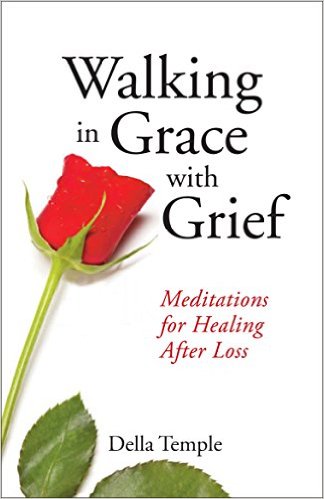
I do not believe this is true. I think that what causes people to seek some kind of solace in dreams of an afterlife is the death of loved ones. Losing someone you love can cause the mind to resort to a strange logic. This is too bad to have happened, so it must not have happened. My loved one cannot be gone from me forever. Something else must be going on instead. Never is this more true than when that loved on is your child. Della Temple faces this almost unthinkable tragedy and shares with readers how she survived it.
The book opens as brutally and starkly as unexpected death itself. Temple and her husband, David, are watching television one evening when guests arrive at their door: two well-dressed strangers come to tell them that their almost 30-year-old son has been killed in an car accident. She does a novelist’s job of conveying the scene and its horror, of her feelings and reactions. I will admit that as the mother of two almost-thirty-year-old sons myself, I found this bit almost too difficult to read. And the odd, almost dissociated numbness of the days that follow comes through as well.
Temple was already a believer in what she calls “the metaphysical” before her son’s death. In the introduction she explains, “This is a spiritual book because I am a spiritual person. I grieved a spiritually based grief. I knew that my loved one was still “alive” in Spirit, and I often felt him surrounding me in love and comfort— especially during the first year after his passing. I accepted this as a natural occurrence, and our talks, Spirit to Spirit, became an integral part of my healing journey. I was also surrounded by some unusual friends who helped me navigate this world of death, Spirit, and life after life.”
And indeed Temple’s walk through this particular darkness is filled with spirit guides and conversations with her dead son. Some readers may find this tremendously comforting. Others will find it silly, but I would submit that it is no sillier than more conventional beliefs about the afterlife. For those who share her new-age beliefs, Temple offers some very specific meditations to help move, gradually and gently through the stages of grief. But this book has much to offer even those who might find that a bit much. She gives very practical advice about healing yourself, keeping a constant eye on your emotions, and letting yourself grieve without getting lost in it.
Temple also talks about things that you might not have thought of if you have never been there, such as how to tell friends (and harder still, acquaintances) about your loss, how to deal with well-meaning but painful comments, how to navigate holidays, birthdays, anniversaries, and how to be sure that you don’t forget to eat or get some exercise. She does all this with examples from her own life, and all advice is given gently and with great tenderness. Even in the midst of her own enormous grief, Temple maintains an understanding of how this might feel to others experiencing something similar.
There are no “shoulds” about how to behave after a loss, Temple tells us. But she does give us the benefit of her experience for when, inevitably, each of us experiences some kind of loss. No matter what your beliefs about what happens when one dies, this book has solid advice and generous comfort to offer.
Links
Della Temple’s Author Site
Facebook
Amazon
Goodreads
Review Overview
Design
Editing
Content
Get an Editorial Review | Get Amazon Sales & Reviews | Get Edited | Get Beta Readers | Enter the SPR Book Awards | Other Marketing Services























Leave A Comment